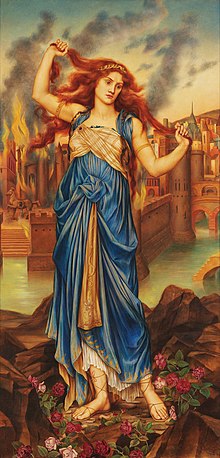
The Cassandra metaphor (variously labeled the Cassandra "syndrome", "complex", "phenomenon", "predicament", "dilemma", "curse") relates to a person whose valid warnings or concerns are disbelieved by others.
The term originates in Greek mythology. Cassandra was a daughter of Priam, the King of Troy. Struck by her beauty, Apollo provided her with the gift of prophecy—either on the condition that she agree to accept his romantic advances, or without prior agreement from Cassandra, depending on the source—but when Cassandra refused Apollo's romantic advances, he placed a curse on her, ensuring that nobody would believe her warnings. Cassandra was left with the knowledge of future events but could neither alter these events nor convince others of the validity of her predictions.
People have applied the metaphor in a variety of contexts, such as psychology, environmentalism, politics, science, cinema, the corporate world, and philosophy; it has been in circulation since at least 1914, when Charles Oman used it in his book A History of the Peninsular War, Volume 5, published in 1914. "both of them agreed to treat the Cassandra-like prophecies which Thiebault kept sending from Salamanca as 'wild and whirling words.'" (The Oxford English Dictionary records use of "Cassandra like" from 1670 and of "Cassandra-like" from 1863.[1]) Later, in 1949, French philosopher Gaston Bachelard coined the term "Cassandra Complex" to refer to a belief that things could be known in advance.[2]
- ^ "Cassandra". Oxford English Dictionary (Online ed.). Oxford University Press. (Subscription or participating institution membership required.)
- ^ Bachelard, Gaston, Le Rationalisme appliqué PUF, Paris, (1949).